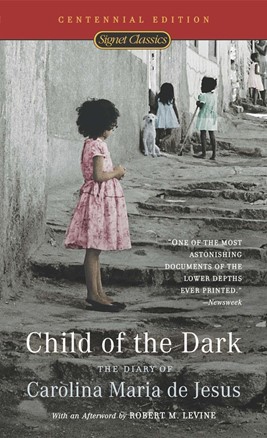Description
A powerful and gripping memoir depicting the harsh realities of life in the favelas of Brazil in the 1950s, and one woman’s resilience in the face of poverty, racism, and social inequality.
Living in poverty in a Brazilian favela, or “slum,” Carolina tried to scrape together a living by collecting recyclables. Among the trash, she found notebooks and papers that she salvaged to write on, and she used these found papers to craft novels, poetry, plays, letters to authorities—as well as her own journal.
In this stunning diary of perseverance in the face of adversity, violence, and starvation, Carolina Maria de Jesus offers a firsthand account of life in the streets of São Paulo that, upon its first publication over 50 years ago, drew international attention to the plight of the poor.
A unique historical account and a critical work in the canon of Afro-Brazilian literature, Child of the Dark offers an essential perspective on the realities and cruelties of life in a favela at the beginning of the “modernization” of the city of São Paulo. Its themes of struggles against marginalization, classism, and racism continue to resonate today.
Includes eight pages of photographs and an afterword by Robert M. Levine
Translated from the Portuguese by David S. Clair
About the Author
Carolina Maria de Jesus was born on March 14, 1914 in Sacramento-MG, where she lived in her childhood and adolescence. Her parents probably migrated from Desemboque to Sacramento as a result of changing the economics of gold mining to farming activities.In Sacramento, she attended primary school in a Spiritualist College, which had a mission aimed at poor children of the town, with the help of influential people. Carolina studied just over two years but learned to read and write there. She later remembered reading posters outside movie theaters and realizing that reading was not just something done in school, but a skill that could be used everywhere. All her reading and writing was based on this short time of formal education. She quit school but never stopped reading and writing.Moving to São Paulo in 1947, Carolina went to live in the now defunct favela of Canindé, in the northern part of the city. She earned money by collecting recyclable materials. When she found notebooks or blank papers in the trash she saved them for her writing. She wrote novels, plays, letters to authorities and poetry in addition to her ongoing journal.Even before all the injuries, losses and discrimination she suffered throughout her life, Carolina revealed through her writing the importance of speaking up in honest testimony, as a means of complaint about social inequality and racial prejudice.Her best known work, Quarto de Despejo (Place of Garbage) – Diário de uma favelada (published in America as Child of the Dark), edited by journalist Audalio Dantas and released in 1960, had an initial print run of 10000 copies, which sold out the first week. More than 55 years since then, the book has already been translated into 13 languages and sold in more than 40 countries. This book is a chronicle of life in the favela do Canindé, at the beginning of the "modernisation" of the city of São Paulo and the emergence in the outskirts. Its cruel and perverse reality was until then little known. This documentary literature, in its unique black female narrative, was known and named as journalism of denunciation of the years 1950-1960. It is still considered a current work, because the theme of problems lasting to this day in the big cities.The work of Carolina Maria de Jesus is an important reference to the cultural and literary studies, both in Brazil and abroad and represents our peripheral/marginal and Afro-Brazilian literature. An example of strength, intelligence and ability to stay forever in the history of our culture.Even today, much of Carolina's production remains unheard. The researcher Raffaella Fernandez still is dedicated to the organization of the manuscripts of the author. In a set of more than 5000 pages, are 7 novels, 60 short texts , 100 poems, 4 theatre plays and 12 letters for Carnival marches.In 2014, as a result of the Projeto Vida por Escrito – Organização, classificação e preparação do inventário do arquivo de Carolina Maria de Jesus, awarded the Prêmio Funarte de Arte Negra, it launched the Biobibliografic Portal of Carolina Maria de Jesus (www.vidaporescrito.com) and, in 2015, released the book Vida por Escrito – Guia do Acervo de Carolina Maria de Jesus, organized by Sergio Barcellos. The project mapped the entire material of the writer who is guarded by several institutions, including: Biblioteca Nacional, Instituto Moreira Salles, Museu Afro Brasil, Arquivo Público Municipal de Sacramento and the Acervo de Escritores Mineiros (UFMG).
